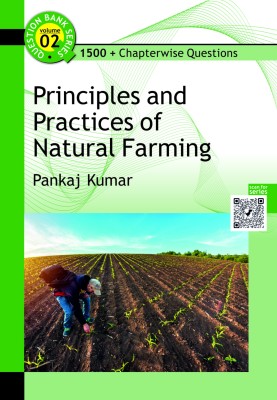
Keywords
Natural Farming (NF), Agroecology, ZBNF (Zero Budget Natural Farming).Jeevamrit, Beejamrit Ghana Jeevamrit,Panchagavya, Mulching (Acchadana), Waaphasa (soil aeration), Indigenous seeds, Seed sovereignty, Ecosystem services, Ecological engineering, Integrated Farming Systems (IFS), Agroforestry, Soil organic carbon (SOC), Biofertilizers, Biopesticides, PGS-India (certification), NPOP (standards), ICAR 6th Deans Committee SyllabusPrinciples and Practices of Natural Farming: Volume 02 : The Question Bank Series - Volume 02
authored by: Pankaj KumarLength: 152 mm | Breadth: 10 mm | Height: 229 mm | Imprint: CONTENT VIBES | Weight: 360 GMS
Principles and Practices of Natural Farming is purpose-built to the ICAR course structure, mapping every chapter to the officially listed units and learning outcomes. It begins with India’s agricultural heritage and the modern history of natural farming, then develops core concepts—definitions, objectives, essential characteristics, and principles—before moving into the recognized pillars and schools of practice.
The book integrates farm design and ecological balance; ecological engineering and community responsibility; ecological, water, carbon, and nitrogen footprints; ecosystem services; and integrated crop–tree–animal systems and cropping approaches. It further covers biodiversity and indigenous seed systems, farm-waste recycling, water conservation and renewable energy, animal rearing in natural systems, nutrient management, and pest–disease–weed management.
Applied and enterprise topics include appropriate mechanization; processing, labelling, and economic viability; certification and standards; marketing and export potential; government and NGO initiatives for chemical-free agriculture; documented case studies; and entrepreneurship opportunities—ensuring students can connect on-farm practice with real-world value chains and policy support.
To support assessment, each chapter concludes with 100 MCQs (single-best, numerical, assertion–reason, matching), yielding practice questions aligned unit-wise to the ICAR syllabus—complete with an answer key for self-evaluation.
Overall, the text blends concept, method, and application so learners can move confidently from classroom and lab to field and enterprise—exactly as envisioned in the ICAR curriculum for Natural Farming.
Pankaj Kumar is presently working as Project Coordinator at the Borlaug Institute for South Asia (CIMMYT), Jabalpur, Madhya Pradesh. He earned his B.Sc. in Agriculture from C.S. Azad Agricultural University, Kanpur, Uttar Pradesh, and his M.Sc. and Ph.D. in Agronomy (both with first-class distinction) from R.A.U, Pusa, Samastipur, Bihar. During his academic journey, he received various scholarships and fellowships to support his education.
He has more than a decade of experience in the field of Agronomy as a Scientist in the CIMMYT system. He is a dedicated professional committed to uplifting rural farmers’ incomes and enhancing their knowledge of new agricultural technologies through FLDs, OFDs, training programs, and technology transfer. His work covers diverse areas such as residue management, direct-seeded rice (DSR), zero-tillage wheat, mechanical rice transplantation, maize-based intercropping systems, seed replacement, seed production, organic farming, crop diversification, weed management, and fertilizer management.
Dr. Kumar has published numerous research papers, book chapters, technology leaflets, and edited books. He has been conferred with several prestigious honors, including the Popular Extension Worker Award, Excellence in Extension Award, Outstanding Agronomist Award and Outstanding Achievement Award. He continues to pursue research and extension work for the benefit of rural farmers.
1 Indian Heritage of Ancient Agriculture,
2 History of Natural Farming,
3 Importance of Natural Farming in View of Climate Change, Soil Health, Water Use Carbon Sequestration,
4 Importance of Natural Farming in View of Biodiversity Conservation, Food Security and Nutritional Security, and Sustainable Development Goals (Sdgs)
5 Concept of Natural Farming; Definition of Natural Farming; Objective of Natural Farming, Essential Characteristics and Principles of Natural Farming
6 Scope and Importance of Natural Farming. Main Pillars of Natural Farming; Methods/ Types/Schools of Natural Farming.
7 Characteristics and Design of a Natural Farm, Concept of Ecological Balance.
8 Ecological Engineering and Community Responsibility in Natural Versus Other Farming Systems,
9 Introduction to Concept of Ecological, Water, Carbon and Nitrogen Foot Prints,
10 Concept and Evaluation of Ecosystem Services, Integration of Crops, Trees and Animals, Cropping System Approaches,
11 Biodiversity, Indigenous Seed Production, Farm Waste Recycling, Water Conservation and Renewable Energy Use Approaches on A Natural Farm,
12 Rearing Practices for Animals Under Natural Farming,
13 Nutrient Management in Natural Farming and Their Sources.
14 Insect, Pest, Disease and Weed Management Under Natural Farming.
15 Mechanization in Natural Farming, Processing, Labelling, Economic Considerations and Viability.
16 Certification and Standards In Natural Farming, Marketing and Export Potential of Natural Farming Produce and Products.
17 Initiatives Taken by Government (Central/State), Ngos and Other Organizations for Promotion of Natural Farming and Chemical Free Agriculture.